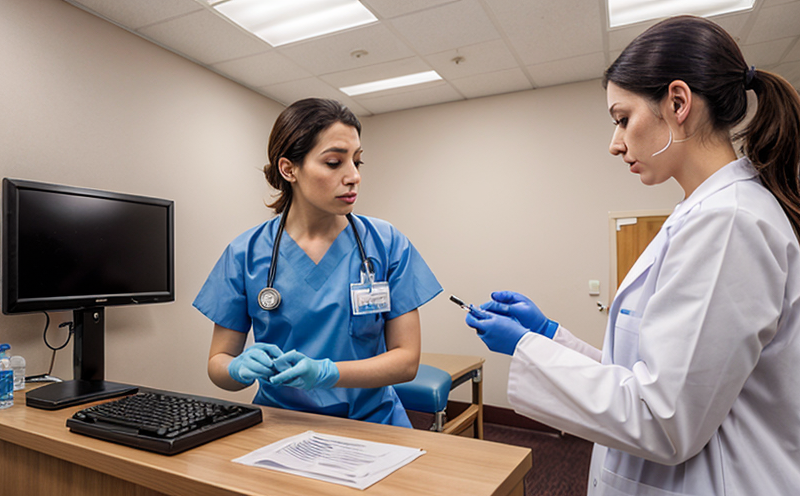Antiviral Drug Screening in Livestock Products
The detection of antiviral drug residues in livestock products is a critical component in ensuring food safety and public health. Antivirals, which are primarily used to treat viral infections in humans, can inadvertently find their way into the food chain through veterinary use or environmental contamination. This presence poses risks not only to human consumers but also to the environment. In this section, we will explore why antiviral drug screening is essential and how our laboratory provides accurate and reliable results.
The process of detecting these residues involves a series of complex steps that ensure precision and accuracy. Samples are first collected from various points in the food production chain, including raw materials, intermediate products, and final products such as meat, dairy, and eggs. Once collected, these samples undergo rigorous preparation and processing to extract any potential antiviral drug residues. This step is crucial because it ensures that only relevant compounds are analyzed.
The detection of antiviral drugs in livestock products requires specialized instrumentation and methodologies. Our laboratory employs state-of-the-art analytical techniques such as Liquid Chromatography-Mass Spectrometry (LC-MS/MS) to identify and quantify these residues. LC-MS/MS is particularly effective because it can differentiate between similar compounds, reducing the risk of false positives or negatives.
The acceptance criteria for antiviral drug screening are stringent and adhere to international standards such as ISO 17025, ensuring that our results are credible and reliable. Compliance with these standards guarantees that our laboratory meets the highest quality requirements. It is essential to note that any detected residues must be below the maximum residue limits (MRLs) established by regulatory authorities like the World Health Organization (WHO), Food and Agriculture Organization of the United Nations (FAO), and local government agencies.
The importance of antiviral drug screening cannot be overstated. Ensuring the absence or minimal presence of these drugs in livestock products protects human health, supports sustainable agricultural practices, and maintains consumer confidence. In the following sections, we will delve deeper into why this service is crucial for various stakeholders and explore its environmental and sustainability benefits.
Why It Matters
The presence of antiviral drugs in livestock products can have severe consequences if not properly managed. These drugs are designed to treat viral infections, but their presence in food can lead to several adverse effects:
- Harmful to Human Health: Chronic exposure to antiviral drugs through diet may lead to antibiotic resistance and other health issues.
- Toxicity Concerns: Some antivirals are toxic, and their accumulation in the body can cause significant harm.
The detection of these residues also has broader implications for the environment. The improper disposal or runoff of veterinary drugs into water bodies can lead to contamination of aquatic ecosystems, affecting both wildlife and human populations that rely on these resources.
Moreover, ensuring compliance with regulatory standards is crucial for maintaining a fair market and protecting public health. Consumers expect safe and uncontaminated food products, and rigorous testing helps build this trust. For livestock producers and processors, adherence to these standards can enhance their reputation and open up new markets for their products.
In summary, antiviral drug screening in livestock products is not just a technical requirement but a critical step towards safeguarding public health and environmental integrity.
Benefits
- Health Protection: Ensuring the absence of antiviral drugs minimizes risks to human consumers.
- Regulatory Compliance: Adherence to international standards ensures legal compliance and avoids penalties.
- Market Access: Meeting stringent testing requirements can open new markets for producers.
- Consumer Trust: Reliable test results build confidence among consumers, enhancing brand loyalty.
The benefits of antiviral drug screening extend beyond immediate health and regulatory concerns. By conducting thorough testing, we contribute to a more sustainable food production system that respects both human and environmental well-being.
Environmental and Sustainability Contributions
- Avoidance of Contamination: Preventing the release of antiviral drugs into the environment helps protect aquatic ecosystems.
- Eco-friendly Production: Ensuring safe food products encourages sustainable agricultural practices.
- Safe Disposal: By detecting and removing residues, we promote responsible handling methods.
The environmental impact of antiviral drug screening is significant. By preventing the contamination of water bodies and soil, our service helps maintain ecological balance and supports biodiversity. This aligns with broader sustainability goals and contributes to a healthier planet for future generations.





